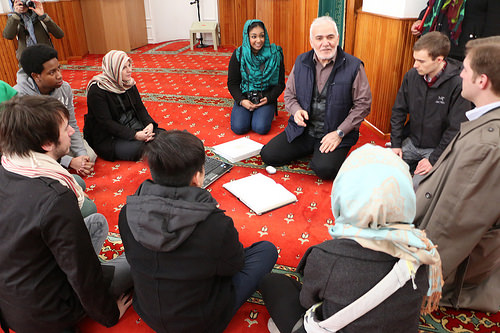Established in Fall 2019, the Islamic Studies minor at UNCG offers students the opportunity to learn about the principles and practices of one of the world’s most rapidly growing religions and to explore how Islam has shaped history, language, and politics on a global scale. Housed in the Department of Religious Studies, the interdisciplinary minor features courses taught by experts from a wide range of units. Students may approach the study of Islam using the methods and perspectives of religious studies, history, political science, and linguistics, to name a few. Increase your intercultural awareness and equip yourself for a dynamic and ever-fluid global world!
*This course only counts toward the minor when it contains Islamic Studies content. Check with the professor to verify.
**If you are not an Honors student, ask Dean Omar Ali for approval to take this course.
Note: not all courses are taught every semester. For currently taught courses, please go to Current Courses.
By the time they complete their minor, students should be able to execute the following Student Learning Outcomes (SLOs):
Students pursuing any job or career that requires interacting with a diverse population – including work in government or politics (foreign service), public affairs, journalism, international business, health professions, and teaching — will benefit from an Islamic Studies minor.
Questions? Email Prof. Alyssa Gabbay at abgabbay@uncg.edu or Prof. Asa Eger at aaeger@uncg.edu.

William Tucker is currently studying Levantine Arabic via a FLAS Fellowship at the University of Arizona alongside three other graduate classes. He hopes to build off of his Religious Studies senior-capstone research studying Muslim-American youth experience/identity in order to develop his graduate thesis. William is volunteering at a local high school, tutoring Syrian and other refugee youths.

Al Rieder was the first graduate of the Islamic Studies Minor at UNCG, where he majored in History and was part of Lloyd International Honors College. A Raleigh native, Al did a year of service with AmeriCorps in Baltimore before working for Guidance Residential mortgage and then volunteering with the Council on American-Islamic Relations (CAIR), the nation’s largest and oldest Muslim civil rights/advocacy/political organization. He eventually got a job at CAIR as the first employee in the new North Carolina office. He is now Regional Community Engagement Manager for CAIR, going across the state to raise funds and advocate for cases he takes on of Muslims being discriminated and bringing politicians to masjid (mosques) to listen to issues that matter to American Muslims.

